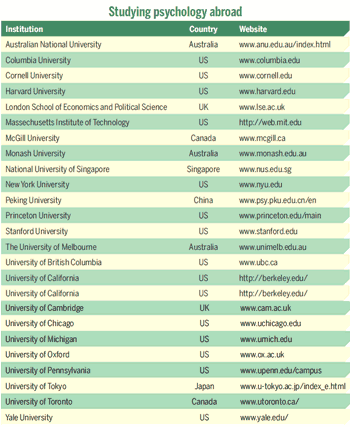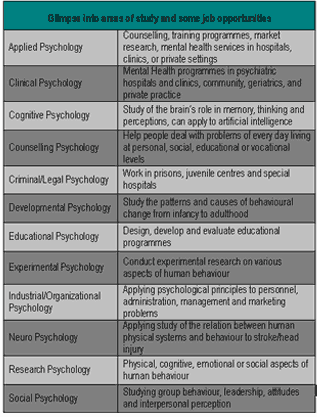 | « Back to article | Print this article |
'I'm not a mind-reader, I'm a psychologist'
When you enter the world of psychology, no student can escape statements like, "Oh, so you can read my mind!" or "I need to be careful about what I say in front of you." But psychology is not about reading minds. It is a discipline that is defined as "the study of human and animal behaviour". In order to enter this sphere, you need to have a genuine interest in human behaviour and have to develop your observational skills, if not already prevalent.
Psychology departments always stand out no matter which space they occupy. People will peep in, but will always be wary of entering this space.
According to Shalini Masih, counsellor at New Delhi's Satyawati College, "Psychology is very time consuming and there is a stigma attached to being a psychologist as well." Students of psychology usually end up being lost in a world of their own, getting into the depths of their self and others. Readings and assignments not only provide you insight into behaviour but also help in developing an understanding into the connection between the mind and body.
How it all began
The first department of psychology in India was established at Calcutta University as early as 1915 when Sigmund Freud was busy understanding the psyche in the Victorian society. Though many would have heard of Freud, not many would be aware of our own Girindrasekhar Bose, an early 20th century South Asian psychoanalyst who was also the first president of the Indian Psychoanalytic Society in 1922. An even lesser known fact is that Bose and Freud carried on a 20-year dialogue through letters. When Bose submitted his doctoral thesis in 1921, entitled 'Concept of Repression,' he blended Hindu thought with Freudian concepts.
The Indian Psychological Association was established in 1924 and the Indian Journal of Psychology was founded in 1926, much ahead of many countries around the world. Bose has found reflection through the writings of Christiane Hartnack, Amit Ranjan Basu, Ashis Nandy, Sudhir Kakar and Mansi Kumar among many others. In spite of the early beginning in the Indian context, psychology is still trying to find its grounding and establish roots as a discipline and profession to be pursued actively.
Careers360 is a complete career magazine.
Levels of study
Psychology is introduced at school levels in India. However, an in-depth study of the subject takes strong roots only at the undergraduation level. You would be able to opt for a BA (Hons) in psychology, a BSc in psychology or a BA in psychology depending on the institution you opt to study in. Remember, only with a high percentage in schooling will gain entry. You end up studying a range of subjects including general psychology, statistics, systems, abnormal behaviour, physiological psychology, and applied psychology to name a few. You will be required to do practicals as part of each course, as well. Conducting a memory test or a personality test or an aptitude test on yourself and on subjects would not remain alien to a student of psychology for long.
When you enter this arena you need to remember that a BA degree is normally not enough and most people end up doing at least a master's after completing their undergraduation. This again depends on the institute you choose to study in but is much more structured and a deeper. A minimum of 55 per cent in your undergraduation is required to apply, along with sitting for an entrance test, group discussion and an interview. Readings and assignments and ongoing research become a part of your world. You would have to choose a specialisation in your second year of MA ranging from child psychology, organisational behaviour, social psychology and clinical psychology to name some of the most popular options. Most people end up sitting for the UGC Net exam for Lectureship during this time and take up academics as a career path or opt for further studies.
Some students who have been studying psychology for five years by now, either end up taking a break and finding a job or they continue to study for an MPhil or PhD degree. Many become inclined towards research and wanting to make a difference in the field becomes a strong need. Shveta Kumaria, a clinical psychologist who did an MPhil from NIMHANS suggests, "One needs to look beyond the conventional, you can use your skills in multiple ways. One needs to understand what one likes and what one doesn't and try to be flexible in one's approach."
You have a large amount of opportunities available such as academics, market research, drug trials, schools, clinics, hospitals, social research, ad agencies or pure psychometric testing. Creativity and innovation can be used to find the right fit. Disaster management is another great option you can explore.
Students who begin to do a PhD find themselves taking up research in a field of their choice, mostly ending up doing innovative work or looking at an already researched aspect of psychology in a unique manner. Ongoing study and reading will become a core part of your personality and interest as a part of this field, a part that develops over the years and never really ends. Discussions, conferences and discourse on various aspects of psychology in terms of motivation, attitude and culture create a unique language of its own. Many students end up feeling like they are talking in a different language when they speak to people who do not belong to the field.
Choosing the best school
Before zeroing in on a school, one needs to decide on the area of specialisation. Even at the BA level you would have to opt for a specialisation such as child psychology or social psychology or applied psychology in your third year. Make sure to choose an institute where the faculty is available for the particular subject. Under the consistent effort of Indian psychologists, cultural and social psychology has become an area that has evolved over the years and is worth pursuing.
The National Institute of Mental Health and Neurosciences (NIMHANS) in Bangalore is an internationally reputed institution, providing state-of-the-art training in mental health. At an MPhil level, with very few seats available, many students sit for the exam more than once to gain entry into this prestigious institution. Tata Institute of Social Sciences is another space that students strive for.
Allahabad University is historically a place where Indian psychology took strong roots and has created many famous Indian psychologists. The University of Delhi also offers various specialisations such as organisational behaviour, clinical psychology and social psychology, a place many students are able to find their area of choice. Though many students remain unaware, you can also opt to be part of IITs to pursue further education in this field.
Branches of psychology
Specialisations lead to in-depth knowledge base in a specified area. A neuro psychologist would find space in healthcare as a specialist who understands the relation between human physical systems to understand behavioural changes after stroke/head injury. A criminal psychologist would find work in prisons, juvenile centres and special hospitals to understand criminal behaviour and the psyche.
Where you could be
But another category that exists requires restoring well being. Assessment, diagnosis and testing become a core part of psychologists working in this area and rehabilitation is the essence of their jobs.
Dr Tanwar stated, "Psychology is a very exciting field for people who enjoy people, but it is a misunderstood field. It requires long years of work, training and education. Academic performance is important and courses are technical." When you are making an earning through this profession, you need to free yourself from the corporate trend in terms of money. Clinical psychologists, counsellors, psychometricians and rehabilitative psychologists largely occupy this space along with psychiatrists, social workers and other specialists.
Job openings for psychologists
Kumaria advises that when after years of work you are earning only Rs 25,000 a month you'll start questioning your decision to have studied psychology but you need to stay with it. She advises that getting some experience from abroad in terms of pursuing short-term courses or getting global experience by joining the likes of Doctors without frontiers will increase your exposure and help build confidence.
Choices also become based on your personal needs at the time you finish your degree. Paresh Shah had graduated with a specialisation in organisational behaviour but opted to join an NGO where he began work as a counsellor.
Psychology as a field remains as an 'all women's subject' in the minds of most people, a thought that makes men feel a bit marginalised when they opt for this subject. However, this didn't deter Shah from staying with the subject and he went on to receive the Richmond Fellowship and worked in the field of psychosocial rehabilitation. It was demanding work, especially at the emotional level. After six years of work experience, he found himself earning only Rs 15,000-20,000 a month, leaving him feeling a little disillusioned.
He opted to enter the corporate world and use the skills he learned while studying organisational behaviour. Shah has a piece of advice for people entering the field of psychology echoed in Masih's words, "They should have the passion and they should also have the patience. You need to think about your orientation and mentors seriously, there are very good courses available abroad. Just remember psychology is not a cake walk."
Qualities of a psychologist
This is largely dependent on the space you choose to occupy but some constants do remain. Masih sums up the skills in terms of the 3 P's of psychology: patience, passion and perseverance, a fact that many students and established psychologists agree to. You require a basic sensitivity towards human nature and need to be ethical in approach. Confidentiality is a must for any psychologist, whether you are operating at the community level, corporate or involved in group processes.
Nishtha Upadhaya, Joint Controller, Defence Accounts (Air Force) and Financial Advisor (R&R Hospital), a university topper at the undergraduation and postgraduation level in psychology always dreamt of joining the administrative services. Her experience in the Defence Ministry led to a feeling that acceptability as a woman doesn't come easy but having studied psychology has helped her in dealing with initial resistance that is always there. Her skills have been recognised by her seniors as well and she is generally posted to offices where there is a crisis of sorts. Studying psychology has created a lot of understanding about her own self but Upadhaya remembers, "No one is supposed to be like you. They are supposed to be different."
Circling the world of psychology
After investing more than five years of your life in psychology (or more), you will realise you have entered a world that is as difficult to enter as it is to exit.
Sudhanshu Mishra had done a master's through a correspondence course from Annamalai University and was an active mental health practitioner. He changed fields and started working with an NGO based in Kolkata. Mishra feels that students entering this field need to be aware that the scope in terms of academics is very stable. Clinical psychology is picking up but various hardships are involved. Applied psychology still has not found its footing though the future of counselling looks very good in India.
Are you keen on a career in psychology? Once you decide the specialisation, and the school to study, the journey becomes a bit easier. Don't be afraid to take the step forward, but remember the three P's required as the journey will be a long one and not so easy. There may be various stumbling blocks and disillusionment on the way but once you have entered this world you will want to stay, sometimes out of choice and sometimes in spite of it. There will be hardships involved, some misunderstanding and monetary issues could crop up. But, the satisfaction you will receive when you help a person in whichever capacity will leave you with a sense of achievement and probably a smile on your face when you fall asleep at night.



